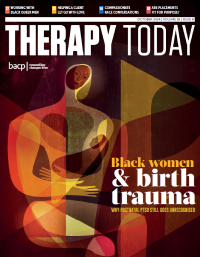My journey to therapy began in 2018 when, after years of battling depression and anxiety, I found myself in a mental health crisis. I had been living and working abroad for almost 20 years, enjoying a fulfilled life. What I didn’t realise until it was almost too late was that focusing on my career and burning the candle at both ends would eventually take its toll. I had replaced my real needs with money, trinkets, flash holidays and an expensive lifestyle, never thinking my life would come crashing down. But it did, and losing my last job was the traumatic tipping point.
The weight of my experiences and the stigma surrounding mental health made me hesitant to seek help. The real wake-up call came with my first suicide attempt, and the realisation that I could no longer navigate these turbulent waters alone. Despite my reservations I decided to seek professional help. It turned out to be one of the most transformative choices of my life, but finding the right therapy was anything but straightforward.
At every assessment I was told that finding a black therapist would either take too long or wasn’t possible. Every time I attended therapy in person or online I was seen by a white, middle-aged woman. Although some were great it gave me insight into why so many black men either don’t engage with therapy in the first place or drop out soon after.
I ended up experimenting with various forms of therapy, which at times felt like wandering through a maze, encountering confusion, dead ends and frustration. I went to The Listening Place charity, which was brilliant, particularly for someone facing chronic loneliness and social isolation. I also attended several men’s peer support groups, which was a humbling experience, listening to the stories.
I decided to use my previous networking skills to find the help I needed, and scoured the internet to find anything that might help. But the language on many mental health websites didn’t resonate with me, and I rarely saw content that fully represented ethnic diversity. I often wouldn’t hear back when I filled in their self-referral forms.
When I eventually found a black therapist it was a game changer. The shared cultural understanding not only made it easier to discuss issues related to race and identity, it fostered a sense of safety and trust in ways I had not experienced before in a therapeutic setting. With the right therapist I could begin the hard work of unravelling the complex layers of my experiences, exploring the interplay of past traumas and more recent stressors. Each session felt like a step closer to self-awareness and healing, which was a huge sense of relief.
As the US Navy SEALs say: ‘Work the problem.’ This mindset helped me identify different approaches to tackle difficult issues. Don’t be mistaken; I’m no Navy SEAL– far from it. But I do love military shows, my favourite being SEAL Team.
As my most recent therapy journey neared its conclusion I felt a mix of gratitude and apprehension. Although I left with helpful tools and insights I still have setbacks that can bring back feelings of guilt and inadequacy. However, one significant breakthrough has been understanding the importance of self-compassion. I had always been my harshest critic, but therapy has taught me to treat myself with the same kindness I would offer a friend. This shift in perspective has liberated me and paved the way for deeper emotional healing.
Therapy helped me purge the mental and emotional burdens that weighed me down, allowing me to emerge stronger and more resilient. It also gave me the courage to share my story and advocate for mental health awareness.
Entering therapy was a daunting but necessary step, the start of a journey of self-exploration and healing that transformed my life. I encourage anyone considering therapy to take that first step. Despite the challenges the journey is worth it. Therapy is not a place of judgment but a space for healing and growth. Your mental health matters, and seeking help is a courageous act of self-care.

